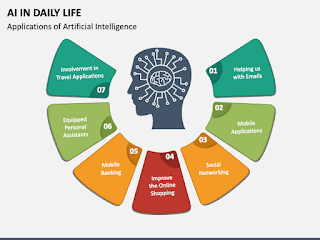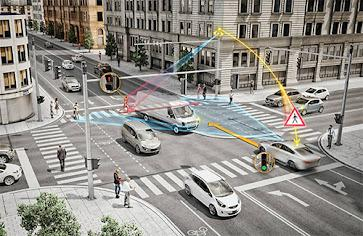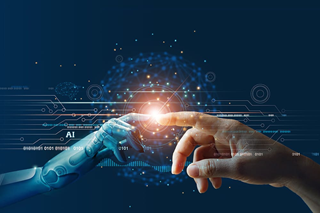AI In Our Daily Lives: How Artificial Intelligence Is Transforming The
Way We Live
Written
by Yeanur Islam
ID: 23136024
15th August 2023
Contents
1. What is AI
2. Artificial intelligence in our daily life
3. AI applications in several fields
4. Future of AI
5. Concerns about AI
6. Conclusion
Artificial
Intelligence or (AI) is the integration of sentient knowledge and intelligence
in machines and computers, involving very intricate algorithms and computer
programs as greater and perfected substitutes for natural human-borne tasks.
Which may include problem-solving, logical reasoning, gain of knowledge through
experience, and adaption to changing situations. The applications of AI
encompassing human life are universally vast, from learning the natural
language for colloquialism to the sophisticated language of computers, all of
which actively add to the recursive nature of human evolution, replicating and
rectifying cognitive functions associated with human intelligence.
Artificial Intelligence In Our Daily Life
For
many of us, artificial intelligence (AI) has sneaked up into our daily lives
discreetly without making a fuss. We are witnessing the existence of it nearly
everywhere right now-at work, at home, in our cars, on our phones and laptop,
in a nutshell, in all of the things that have become a must for us to go
through a regular day.

Furthermore, AI happens to understand us better than ourselves
ironically. It understands what kind of movies, tv episodes, music, and
companies we prefer and enjoy. Apart from our personal life, AI is surprisingly
contributing to a variety of sectors such as automobiles, healthcare, the
economy, e-commerce, entertainment, and so on. In short, AI is having an impact
on every sector of modern life. The world is yet to watch how powerful and
sophisticated AI will become over time.
AI In Healthcare and Medicine
Artificial
Intelligence is the future and not just for telecommunications and software,
but also healthcare. With recent improvements in AI, the technology is finally
viable for professional practices in many healthcare fields, promising to bring
enormous advantages to both the medical professionals and the patients being
diagnosed. A few examples of the jobs AIs can do now is Medical Imaging
Diagnosis, Predictive and Genomic Analysis, which take advantage of AIs'
ability to scan and calculate large sets of data and use algorithms to find
optimal, efficient results, such as analyzing large sets of images, forecast
information and genetic information respectively. AI can also extract
information from literature, and patient health records, which can allow it to
afford personalized treatments for patients which otherwise would not be
viable. AI also demonstrates abilities to help staff, such as assisting in
surgery via specialized robots, monitoring patients via wearables, and
streamlining tedious but important tasks such as patient billing and
appointment scheduling.

https://media.tehrantimes.com/d/t/2020/12/21/4/3636233.jpg
It has
come to a point where they can also come in handy in teaching patients about
diseases and their prevention. This is done through AI Chatbots, which grow
more intelligent by the day as they scan larger and larger sets of medical data
and human feedback.
AI in Industry

https://amfg.ai/wp-content/uploads/2018/08/Industry-4.0-and-Manufacturing-Processes-e1533908951467.jpg
Through collaboration between robots and
people, artificial intelligence (AI) plays a critical role in Industry,
improving product uniformity, efficiency, and cost reduction. Automation
powered by AI links machines, allowing for data interpretation and
decision-making. Its technological characteristics, problems, and applications
are evolving the shape of today's industry. AI highlights the ability to
automate production phases, connect development chains, improve efficiency,
forecast repairs, and visualize the manufacturing environment. The combination
of AI and Industry offers industrial progress and increased manufacturing
ingenuity.
AI in
E-commerce
The
E-commerce sector is not left behind. It is also being revolutionized by
Artificial intelligence by providing solutions with a goal to enhance user
experiences, streamline processes and spur corporate growth.

https://goonline.io/blog/wp-content/uploads/2023/03/5-1024x576.jpg
AI
algorithms make personalized product suggestions that monitor user behavior and
boost the rate of engagement and conversion rates. Not only that AI-generated
chatbots are available 24/7 offering customer support by responding to
questions, helping with purchases, and resolving difficulties. Prices based on
demand, competitor pricing, and inventory levels, helping businesses stay
competitive and maximize revenue are also some of the benefits that are
optimized by artificial intelligence. AI offers visual search technology which
practically enables customers to upload photographs of their desired products.
It enhances and modifies search efficiency and user convenience. Moreover,
AI-powered inventory management is a chef's kiss for online service providers
as it makes the way easy by predicting demand trends, optimizing, stock levels,
lowering stockouts, reducing excess stock, and boosting supply chain
efficiency.
AI in Transportation
The
transportation industry has been completely changed and the credit goes to
artificial intelligence due to cutting-edge applications. These modified
applications are in constant run to boost productivity, security, and user
experience.

https://trafficinfratech.com/wp-content/uploads/2018/06/Transforming-the-Transportation-Ecosystem.jpg
Autonomy
vehicles, traffic management, and predictive maintenance are the most
revolutionized facilities offered by AI. AI-powered autonomous vehicles are self-driving. There are many motor companies that have already incorporated AI to
introduce self-driving features to consequently revolutionalize the modern
driving experiences. These self-driving cars use sensors, cameras, and lidar
data to navigate highways and make decisions at the moment. The main goal of
these self-driving cars is not only to
minimize human error-related accidents but also to improve traffic flow. With the use of GPS, traffic cameras, and mobile
apps, AI algorithms analyze information to predict traffic patterns and suggest alternatives
with n aim to create safer and more effective transportation for humans.
Application of AI in this transportation industry has helped us to reduce
traffic, accelerate travel times and enhance overall road efficiency.
AI in Education

https://michiganvirtual.org/wp-content/uploads/2022/02/790-1024x641.jpg
AI has
revolutionized education by introducing innovative applications that create
more engaging, enjoyable, and comprehensible learning experiences. Personalized
learning through AI-powered platforms analyzes individual learning patterns and
adjusts content accordingly, catering to strengths and weaknesses. AI-based
assessments, known as adaptive assessments, offer real-time adjustments to
question difficulty, ensuring accurate evaluation and valuable feedback.
Specialized AI tutoring chatbots provide immediate responses, aiding
understanding and promoting self-directed learning. Language learning apps
offer instant pronunciation feedback and interactive exercises, accelerating
language skill development. AI empowers teachers with analyzed student
performance data, guiding instructional strategies. Virtual classrooms via
AI-driven video conferencing expand cross-cultural exposure. AI also assists in
scheduling, enhancing time management for better learning outcomes. This
integration of AI reshapes education into tailored, accessible, and captivating
opportunities, facilitating adaptation in a changing educational landscape for
both educators and learners.
AI in Entertainment and Media
Artificial Intelligence (AI) has significantly
transformed entertainment and media, revolutionizing content creation,
distribution, and engagement.
https://img.freepik.com/free-psd/social-media-3d-icons-pack_135149-61.jpg
AI
algorithms analyze viewer history and preferences to offer personalized content
recommendations, enhancing user engagement on streaming platforms. This
tailored experience keeps users invested and engaged. AI's impact extends to
generating music compositions, artwork, and articles, aiding creators with
suggestions, and automating tasks. For instance, AI-powered tools assist in
video editing by automating trimming, transitions, and effects, streamlining
the content production process. In visual media, AI advances visual effects in
movies, animations, and video games. Deep learning models replicate lifelike
textures and lighting, pushing the boundaries of visual storytelling. Social media
trends and interactions are analyzed by AI to provide insights into audience
preferences, helping creators customize content to meet expectations. Automated
Journalism employs AI algorithms to generate news articles from structured data
sources, freeing up journalists to focus on comprehensive reporting. AI also
safeguards intellectual property by using content recognition systems to detect
unauthorized use of copyrighted media. Moreover, AI-driven consumer behavior
analysis enhances targeted advertising and marketing strategies, leading to
improved engagement and ROI. Overall, the integration of AI continually
reshapes creative processes, audience interaction, and content delivery,
fostering innovation in the entertainment and media industry.
AI in Agriculture
The
induction of artificial intelligence innovative solutions is revolutionizing
agriculture, improving crop yield, resource management, and sustainability.
https://dynamics.folio3.com/blog/wp-content/uploads/2021/03/shutterstock_1213436671.jpg
Precision
Farming utilizes AI to analyze data from satellites, drones, and sensors in
order to monitor the health of crops, soil moisture levels, and weather
conditions. This technology enables the accurate application of irrigation,
fertilizers, and pesticides, ultimately maximizing crop yield. AI-powered image
analysis is used to detect signs of disease, pests, or nutrient deficiencies in
crops, enabling prompt intervention and minimizing crop loss. AI-equipped
machines indulge in automated performed tasks such as planting, harvesting, and
sorting crops with great precision, thereby lowering labor expenses and
enhancing productivity. AI models are used to analyze climate data and predict
extreme weather events, enabling farmers to effectively manage risks through
adaptive strategies. Smart irrigation systems, which are empowered
by AI, conserve water and prevent over-irrigation by adjusting the usage of
water according to current soil moisture and weather conditions in real time. AI-powered sensors are used to monitor the
health and behavior of livestock, enabling the early detection of illnesses and
the optimization of breeding practices. The utilization of AI technology in
agriculture improves productivity, sustainability, and resource management,
thereby promoting more efficient and eco-friendly farming methods.
Future of AI
https://bernardmarr.com/wp-content/uploads/2021/12/Future-Developments-of-AI.jpg
The
future of AI is bound by thrilling prospects in various fields. AI will
revolutionize industries by advanced automation of intricate tasks, thereby
improving efficiency and productivity. The
healthcare industry will be revolutionized by AI-driven diagnostics,
personalized medicine, and drug discovery, resulting in outcomes most
beneficial for patients. The transportation and logistics industry will be
making strides with the help of autonomous systems such as AI-powered
self-driving cars, drones, and robots AI will continue to provide personalized
learning experiences, catering to the unique needs of each student and
enhancing academic success capabilities. Additionally, AI will also continue to
progress in comprehending human language, facilitating effortless communication
with machines. Focusing on ethical guidelines and responsible development of AI
will help address concerns such as bias, privacy, and transparency. AI will
enhance personalization across various aspects such as marketing, entertainment,
healthcare, and shopping. Collaboration between AI and humans will become
increasingly prevalent, enhancing human competence, proficiency in the process,
and as well as aptitude for problem-solving in numerous hurdles. The future of
AI is marked by innovation, integration, and collaboration, which are
positioned to reshape industries and improve our lives in remarkable manners.
Concerns of AI

https://xaltius.tech/wp-content/uploads/2019/03/2nd.jpg
Concerns
about AI stem from its rapid advancement and its potential impact. Key concerns
include:
The
automotive elements driven by AI might result in job losses in different
industries, necessitating the need for workforce retraining and strategies to
deal with job displacement. Artificial intelligence bears risks of intrusion of
privacy which can occur due to AI's data-driven capabilities, where personal
data is utilized for analysis and decision-making. AI systems may face security
risks such as hacking and manipulation, resulting in data breaches, the spread
of misinformation, and cyberattacks. Determining responsibility for AI errors
or decisions can be a challenging task, which can result in potential legal and
ethical challenges due to the lack of accountability. As AI becomes
increasingly integrated into our daily lives, concerns emerge about the
decrease in human interactions, which could consequently result in isolation
and emotional detachment. If the widespread incorporation of AI is not
monitored properly and is not balanced with retraining and job creation in
emerging fields, it could result in significant unemployment. A definitive
consensus among policymakers, researchers, ethicists, and industry leaders is
needed to address these concerns, and only after unifying against these matters
of concern can we develop regulations, guidelines, and ethical frameworks that
guarantee the responsible development and integration of AI into society.
Conclusion
AI has
seamlessly integrated into our daily lives, transforming the way we interact,
work, and make decisions. From voice-activated personal assistants that
streamline tasks to recommendation systems that tailor content to our
preferences, AI enhances convenience and efficiency. It powers healthcare
innovations like personalized treatments and early disease detection, while in
transportation, it drives self-driving cars and optimizes traffic management.
AI's influence extends to education with personalized learning platforms and
creative fields with AI-generated content. As we embrace AI's potential,
ethical considerations, and responsible development remain paramount to ensure
its positive impact on our evolving digital world.
Yeanur Islam
A dedicated student whose curiosity knows no
bound and currently pursuing a bachelor's degree in Biotechnology in BRAC
University.













Impressive !
ReplyDelete